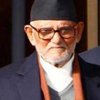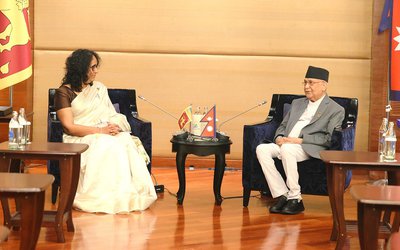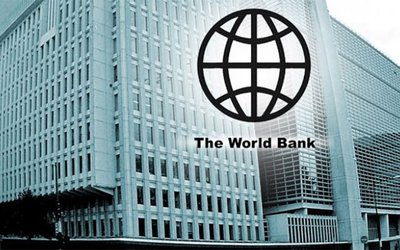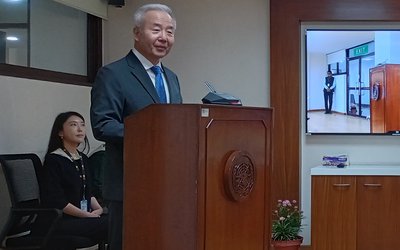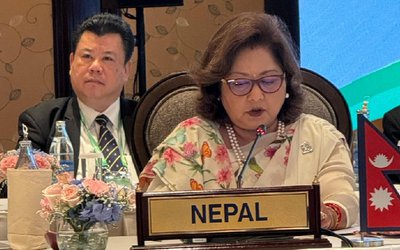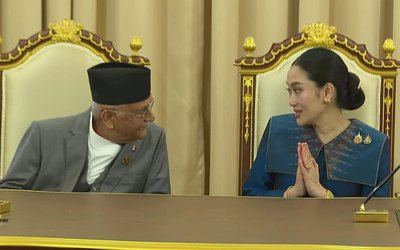
The theme selected for the session 'Delivering on and implementing a transformative post-2015 Development Agenda' could not have been more relevant at a time when inequality and deprivation remain at the core of ongoing turmoil across the globe.
The world has witnessed unprecedented level of interdependence and interconnectedness. This has changed the dynamics of engagement between and among nations, putting multilateralism at the center of global affairs. The universality of membership gives the United Nations the power of legitimacy to speak for the humanity as a whole.
We commend the Secretary-General for convening the Climate Summit. The momentum generated at the summit should pave the way next year for a binding agreement on climate change with long-term and comprehensive global commitments for climate solutions based on the principles of 'common but differentiated responsibilities, equity, and respective capabilities'.
It is an irony that the world’s most vulnerable countries happen to be the worst victims of climate change for no fault of theirs. There should be special provisions for climate financing, additional to regular ODA, for addressing the mitigation and adaptation needs of the least developed countries and small island developing states.
Terrorism is an anathema to humanity. It is a serious threat to peace, security and development. Nepal unequivocally condemns terrorism in all its forms and manifestations. We share the concerns over growing scourge of terrorism, extremism and religious fundamentalism. In this context, we welcome the convening of the UN Security Council summit meeting earlier this week and support the adoption of a resolution on Foreign Terrorist Fighters. We urge for an early conclusion of a comprehensive convention on international terrorism; and the effective implementation of the provisions of the UN global counter-terrorism measures. Nepal believes that terrorism can better be tackled under the aegis of the United Nations with a coordinated global response.
Peacekeeping has emerged as the central activity of the United Nations and the innovative tool to deal with challenges to peace and security. Nepal is proud to have been contributing, ever since its inception, to the maintenance of international peace and security through UN peacekeeping operations in the troubled parts of the world. Nepalese blue helmets have been commended for their professionalism and performance in trying circumstances. We are currently the 5th largest troop contributor to this flagship activity. As a responsible member of the international community, Nepal will continue to participate in the peacekeeping operations and promote gender equality through the increased participation of women in peacekeeping, with greater commitment and dedication.
While we reiterate our profound commitment to this activity, we also urge this world body to give due consideration to safety and security of the peacekeepers. Nepal calls for fair share of leadership opportunities both at the headquarters and the fields commensurate with member countries' troops contributions.
Nepal stands for a general and complete disarmament of all weapons of mass destruction in a time-bound, verifiable and effective manner.
International peace and security cannot be achieved amidst continued race for armaments. We are concerned by the lack of progress in major multilateral negotiations on disarmament, particularly on nuclear disarmament. We are also concerned for the lack of progress in controlling illicit transfer of small arms and light weapons. We call upon the member states, especially the nuclear weapon states, to halt the militarization in all spheres, and step up measures for disarmament so as to release much-needed dividends for development.
We emphasize the promotion of peace and disarmament through dialogues, education and awareness creation, and wish to see an enlarged role of the UN Regional Centre for Peace and Disarmament based in Kathmandu.
We call for bridging the 'digital divide' and wider diffusion of information technologies. Nonetheless, modern technology must not be misused to interfere in other countries' internal affairs. It is time that a code of conduct through multilateral approach, be agreed upon to regulate the flow of information.
Ebola epidemic has taken the form of global public health emergency. This house with its professional reservoir at the WHO, should focus on improving the public health security system to address symptoms and root causes in a coordinated manner.
As a least developed and landlocked country, we face structural constraints, capacity gaps and pervasive and complex development challenges. My delegation underlines the urgency for addressing the special needs of the LDCs and to support them with enhanced provision of resources for inclusive development.
Nepal calls upon the international community particularly donors to fulfill all the commitments made in favour of LDCs. We underline the timely, full and effective implementation of Istanbul Programme of Action for the LDCs.
We would like to emphasize on the development of an ambitious and result-oriented instrument in November this year to succeed the Almaty Programme of Action for LLDCs.
We call for the immediate implementation of duty free and quota free market access for LDCs' products to enable them reap benefits from the global trading system. Equally important is to help them overcome supply side constraints through predictable and effective provisions of support.
Nepal aims to graduate from LDC status by 2022. An enhanced level of international support to build our productive capacity, improvement in supply side capacity and minimizing shocks and vulnerabilities and, above all, bringing about structural transformation will be critical to meet this target.
Nepal remains fully committed to the protection and promotion of human rights and has put required institutionalized mechanisms in place. National Human Rights Commission of Nepal enjoys a constitutional status and its mandate conforms to Paris Principles.
We remain constructively engaged with all UN human rights mechanisms and the international community in the protection and promotion of human rights.
We strongly believe in universality, indivisibility, non-selectivity and interdependent character of all human rights, including the right to development.
We reject the politicization, and selectivity in the application of human rights standards.
My Government is determined to bring a dignified closure of the past dating back to the armed conflict. We believe the Truth and Reconciliation Commission, and Commission on Disappearances, will help put our past behind us and prevent recurrence of the grave violations of human rights. I want to reassure the international community that there will be no blanket amnesty for grave crimes.
We underline the need to ensure the rights and well-being of migrant workers. We therefore deem it necessary to define the roles and responsibilities of the countries of origin, transit and destination to safeguard the basic rights of the migrant population.
We are concerned by the escalation of conflicts with massive casualties in different parts of the world. Nepal calls for stepping up political and diplomatic means to address the root causes of conflicts, and make concerted efforts towards the peaceful settlement of issues.
Nepal has always supported the call for a just, lasting and comprehensive peace in the Middle East and end the spiraling conflict in the region. We recognize the legitimate rights of the Palestine people based on UN resolutions, and encourage Israel and Palestine to live as neighbors within secure and recognized international boundaries.
Situation in Afghanistan, Iraq, Libya, and Syria demands a more proactive UN engagement. While supporting the independence, sovereignty, and territorial integrity of these countries, we urge the United Nations to play an active role for political settlement and help these countries move towards national unity, reconciliation, and reconstruction. We welcome the formation of unity government in Afghanistan and smooth transfer of power following the announcement of the election results.
We hold the view that the people of Ukraine should enjoy the rights to freely decide their destiny without any outside interference. It has been our consistent policy that sovereignty, territorial integrity, political independence and non-interference must be strictly adhered to in solution to disputes under all circumstances.
Our unwavering faith and long struggle for a democratic system of governance has given us strength for mainstreaming the armed Maoist rebels into a peaceful democratic process and lead a successful transition from autocratic monarchy to democratic republican order, thereby setting unique models. Political parties in Nepal including the Maoists are now working together to have a democratic constitution promulgated through the elected Constituent Assembly.
My government remains committed to take the parties both within and outside the Assembly on board within the framework of constitutionalism, political pluralism and the rule of law to put the country on the path of peace, stability, development and democratic system of governance.
We greatly appreciate our neighbors, India and China, the United Nations and friends and well wishers in the international community at large for their support and solidarity to the peace process and development efforts.
We firmly believe that democracy is indispensible for peace, progress, stability, and prosperity. Peace, democracy and sustainable development are inextricably linked and mutually reinforcing. Development is not possible in the absence of peace, which, in turn, cannot be attained in the absence of democracy. Political instability and lack of democratic institutionalization stood on our way of harnessing rich potentials of hydropower, and tourism in the country.
The post-2015 development agenda only becomes truly transformative when the pressing needs and priorities of the most vulnerable and marginalized countries and societies are faithfully accommodated into the broader global agenda and are provided with sufficient resources to achieve them. A holistic development process does not leave an unfinished agenda behind, so the remaining task of the MDGs should be fully incorporated in the post-2015 agenda.
We call for a fair, sustainable, equitable, and inclusive development by respecting the diversity of all nations. We are of the opinion that ensuring a broader social justice within nations and political and economic equality between nations should be a part of the new development order.
We consider corruption as the biggest enemy of the people and threat to peace, stability, and development. Corruption weakens the foundation of democracy, erodes the rule of law and degrades productive capacity of the nation. My government has underlined the importance of transparency, accountability and zero tolerance for corruption as prerequisite to improve the quality of governance and deliver results to the people.
Nepal's foreign policy is inspired by the purposes and principles of the United Nations. People's aspirations for peace, stability, progress, decency, dignity, and prosperity are firmly embedded in it. We strongly believe that peaceful co-existence; mutual respect for each other’s sovereignty and territorial integrity, non-interference in the internal affairs of other states, and equality and mutual benefit should constitute the fundamental tenets of inter-state relationship.
We have witnessed profound changes in the dispersal of geopolitical and economic power among nations in recent years. Nepal- herself a seat of cultural diversity, with its proximity to two powerful ancient civilizations, India and China which are growing rapidly has immense opportunities to benefit. Peace, stability, and democracy in Nepal would pave its way for reaping the benefits from economic dynamism in the neighborhood and at the same time act as a stabilizing force for peace and prosperity in Asia and the world at large.
Reforms of the United Nations including the Security Council need to reflect contemporary realities for making it more effective, representative, responsive and capable of handling the increasingly complex global problems. We support the expansion of membership in both permanent and non-permanent categories. The 70th anniversary of United Nations next year should be an occasion to ensure the representations and increase the voices of developing countries in the Security Council. In this context, Nepal reiterates its support to the desire of India, Japan, Germany and Brazil to serve as permanent members in the expanded Security Council. We also believe that the African continent and member states which have contributed to the maintenance of international peace and security should be given due consideration in any expansion.
In seven decades of the United Nations, it has been found to be most successful when we honour the letter and spirit of the UN Charter and decisions we make. B.P. Koirala, the first elected Prime Minister of Nepal while addressing the 15th session of this Assembly in 1960 had said, and I quote, 'the real solutions of the world problems, including the problem of world peace and prosperity, lies in the direction of strengthening and extending the authority of the United Nations. This authority will be strengthened and fortified if the decisions of the United Nations are respected faithfully and loyally by all powers, big and small.' End of quote.
The need today is to be true to the letter and spirit of every decision we make for the good of humanity. In conclusion, my government reiterates its profound commitment to the principles and purposes of the UN Charter as embodiment of peace, progress and prosperity.
Excerpts of prime minister Sushil Koirala’s statement delivered at the sixty ninth session of the United Nations General Assembly, on 26 September 2014, New York.
- Irreversible March To Democratic Pluralism
- May 24, 2014
- India and China remains focus of Nepal
- May 08, 2014
- International Conference on Community Based Adaptation
- May 02, 2014
- BIMSTEC for regional prosperity
- Mar 05, 2014
- ‘Our primary focus is on neighbouring countries’
- Feb 15, 2014
